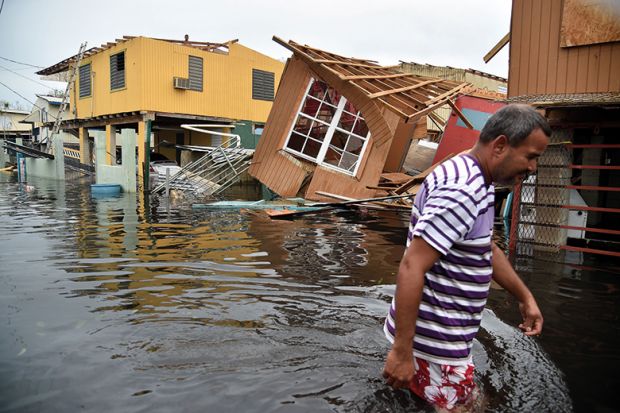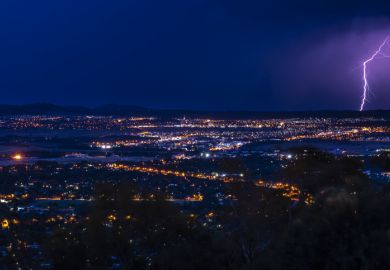Scientists in Puerto Rico have warned that the island faces an impending brain drain after deadly storms caused millions of dollars’ worth of damage.
Tens of thousands of people have fled the Caribbean region since two category four hurricanes, Irma and Maria, hit in September, killing at least 48 people and leaving 117 still unaccounted for in Puerto Rico alone.
While damage to homes and physical infrastructure can be cleared and rebuilt with time, a dearth of skills and research could have devastating long-term effects on the wider community, according to sector leaders.
“We are definitely very worried about a brain drain,” Giovanna Guerrero-Medina, executive director of non-profit organisation Ciencia Puerto Rico, told Times Higher Education. “Difficulty getting science back on track will affect future generations of scientists and the diversity of the scientific workforce.”
For the moment, universities have a number of short-term hurdles to surmount, such as replacing hundreds of thousands of dollars’ worth of lab supplies and lost equipment. And much of the region has still not regained access to the internet and mobile phone networks.
Significant higher education institutions on the island, which has a population of 3.4 million, include the University of Puerto Rico (UPR) and the Interamerican University of Puerto Rico.
At UPR, staff have said that they are committed to working normal working hours in so far as they able, but intermittent power supply means that they can work only fitfully.
“My lab is doing pretty well, but others are in worse condition,” said Gregory Quirk, a professor in the department of psychiatry at UPR. “I have not heard that colleagues want to move abroad, but I think the storm may hurt future recruiting of faculty, and some young Puerto Ricans finishing [their postdoctoral study abroad] may have second thoughts about returning.”
Brain drain is by no means a new problem for Puerto Rico. A history of poverty and intermittent natural disasters have led to a well-documented pattern of the island’s brightest opting to further their work and studies in more stable campuses abroad that offer greater opportunities.
Before Hurricane Maria, the territory’s public debt equalled 76 per cent of its gross domestic product – $74 billion (£55.6 billion). Some 45 per cent of islanders lived in poverty, and 10 per cent were unemployed – a figure that the devastating storms will have done little to help.
“Over the past few years, brain-draining in Puerto Rico has been speeding up because of our financial crisis,” said Ubaldo Córdova-Figeroa, an associate professor in UPR’s department of chemical engineering. “There are fewer faculty in tenure track, fewer researchers, and more work for those who stay in the university.
“Significant budget cuts to the public university are also affecting academic life in general…unfortunately, we expect things to get worse. Real and permanent action requires a lot of effort from the global academic community.”
Reiko Fitzsimonds is director of a new grants programme for the Puerto Rico Science, Technology and Research Trust, which was set up to provide allowances of $500 to faculty, students and teachers to help them with travel costs and to assist in the securing of temporary accommodation for work and study.
“Grantees are warning that a lot of students are thinking of leaving for a few months, and many of those will never come back,” she told THE.
Dr Fitzsimonds herself was forced to leave the island after the neighbourhood in which she lived was destroyed.
Nevertheless, she remains “cautiously optimistic” about the situation. “In some ways, leaving for the short term is the only way to maintain productivity, given the slow pace at which electricity and telecommunications are being restored.
“I actually see a silver lining in opportunities for new, deeper, creative collaborations and connections that may come from the generosity and coming-together of scientific communities. It is an opportunity for new global investment and funding sources.
“I know that private investors were not very aware of universities in Puerto Rico before the storms. At least now it’s come to the world’s attention that there is a community here to invest in, because scientific advancement is critical to the economic redevelopment of Puerto Rico.”
Register to continue
Why register?
- Registration is free and only takes a moment
- Once registered, you can read 3 articles a month
- Sign up for our newsletter
Subscribe
Or subscribe for unlimited access to:
- Unlimited access to news, views, insights & reviews
- Digital editions
- Digital access to THE’s university and college rankings analysis
Already registered or a current subscriber? Login







